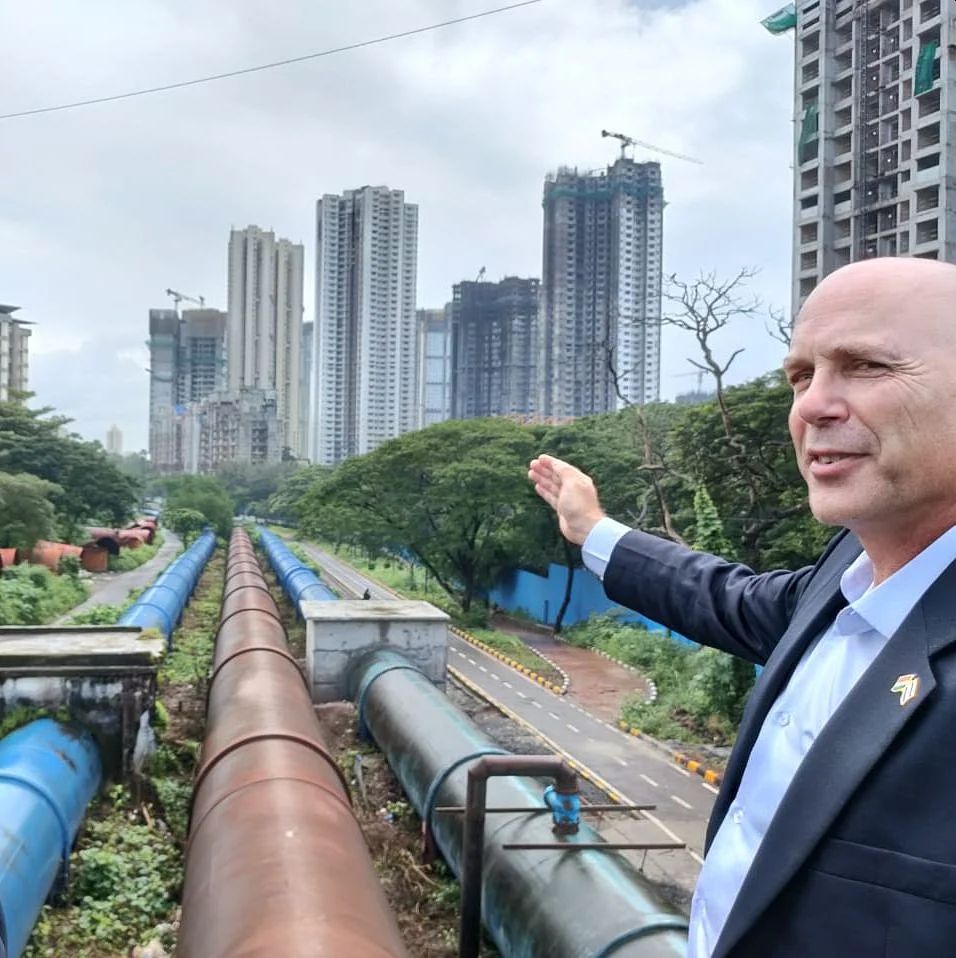https://www.freepressjournal.in/business/solar-powered-decentralised-desalination-plants-will-become-popular
Solar-powered decentralised desalination plants will become popular for water
Israeli hydrogeologist Dr Lior Asaf, the first-ever Water Attaché to India, recently participated in a roundtable discussion on Mumbai-Israel Water Cooperation. This discussion, focused on different issues related to water in Mumbai, was organised by the Consulate General of Israel in Mumbai in association with Observer Research Foundation (ORF) and BSE.
After the discussion, Asaf spoke to FPJ’s Jescilia K and R N Bhaskar on desalination. Asaf specialises in groundwater hydrology, environmental monitoring, surface water and watershed management, integration of computational methods and visualisation with Geographic Information Systems (GIS). In India, he is handling the India-Israel water cooperation.
Edited excerpts:
Why is desalination important?
Natural water resources are not enough to support the country’s (Israel’s) needs. If we want to use wastewater after treatment for agriculture, it has to have low salinity. Meanwhile, natural water sometimes contains high salinity. For instance, the sea of Galilee water, which was the major source for domestic use in the past, contains 300 milligrams of chloride per litre. If you add another 100 milligrams of chloride (through sewage water), then the level goes up to 400 milligrams — which is a high salinity to reuse water.
The desalination process is to reduce salinity. This is because wastewater plant is not reducing salinity. It removes biological contamination, and other contamination but not salinity. If you start from desalination of water and supply water that contains less than 150 mg of chloride, it is a good source of water. Using desalination at the source allows us to use water a second time for agriculture.
How many times do you recycle rainwater in Israel?
Half of the water that we use in Israel is for agriculture — 45 per cent of this need is addressed by natural resources. We allow rainwater to percolate in the ground and charge the aquifer.
The other 50 per cent comes from wastewater. We are speaking about 500 million cubic metre per year. Israel needs 1 billion cubic metre per year for its agricultural needs.
For domestic and industrial use, the water is coming from desalination plants. About 80 per cent of these needs are addressed from desalination and 20 per cent comes from natural resources.
Overall, the consumption of water through natural sources is only 50 per cent.
Does Israel prioritise water based on its uses?
The topmost priority in the case of allocation of water (24×7) is given for domestic use. In addition, the focus is to give good quality water to the citizens 24×7 in Israel.
In the case of the agriculture sector, it is about providing a good and reliable water system.
In the case of other sectors, there is no priority. We ensure that we supply water to all the needs. However, there are some economical measurements to promote the reuse of (treated) wastewater.
If someone is using freshwater then the level (of water available to that person) will change. In the case of a good year, it will be 100 per cent fresh water and if it is a drought year, the water consumption from natural resources will reduce. This means they will get only 50 per cent (of water compared to the previous year). However, if you get water from wastewater treatment plants, the water supply will continue to be the same every year. In addition, the farmer will get that at a reduced price. The farmers will pay less if they use treated water coming from wastewater treatment plants. So, farmers prefer recycled water over natural sources. Because there is a fixed cost, the farmer can plan his budget and his or her business.
How much does desalinated water cost?
Water is priced depending on the scale and source of the water. The price of water for a desalination plant is around 50 cent per 1,000 litres. This means it is 0.05 cents per litre. This price will be higher compared to natural water. However, Israel did not have any other option. It is a lot cheaper compared to bottled water. In Israel, most people drink water from the tap rather than consume bottled water.
Israel has the largest desalination project. Do you see many such large plants coming up? What are the challenges in upgrading the facility?
When we have been upgrading, we found that one of the key issues of plants is reducing the price of energy. It is a very large consumer of energy. Energy is a large cost in the case of such facilities. If solar power is applied, we can reduce the total cost. In a long run, we are looking at ways to desalinate the wastewater after going into the aquifer. It can be used as a source.
I was involved in a project in Papua Guinea. I had designed a solution for an island that can be replicated for small communities or coastal communities as well. This solution can be operated using solar energy.
Going forward, there will be a market for the big desalination plants and also for decentralised systems operated by solar energy.

Israeli Water Attaché visits Mumbai to study Maharashtra’s water woes
The Consul General of Israel in Mumbai Kobbi Shoshani met the heads of water authorities of Maharashtra and introduced them to the newly appointed Water Attaché to the Embassy of Israel in India Dr. Lior Assaf.
This year marks the 30th year of commencement of full Diplomatic relations between Israel and India, and Asaf is the first-ever Water Attaché to India appointed by the Government of Israel.
In his maiden two-day visit to Mumbai, Asaf attended meetings with the key stakeholders of the water management in Maharashtra in order to study Maharashtra’s water-related processes. They also understood and identified the areas of cooperation with Israel on this issue.
A planned round-table dialog identifying the water management issues faced by the city of Mumbai was organized in association with Observer Research Foundation and BSE Institute. During the discussion, the Chief Hydraulic Engineer of Brihanmumbai Municipal Corporation Mr. Ajay Rathod pointed out the key obstacles that are prevalent for the disruption of water supply into the maximum city of Mumbai. From the Israeli side, Dr. Asaf also shared a presentation on Israel’s water management models and sustainable strategies that helped the country become self-sufficient in water-related issues. The roundtable also witnessed participation from relevant technical water professionals working with the private sector, NGOs, policymakers, and journalists.









































COMMENTS